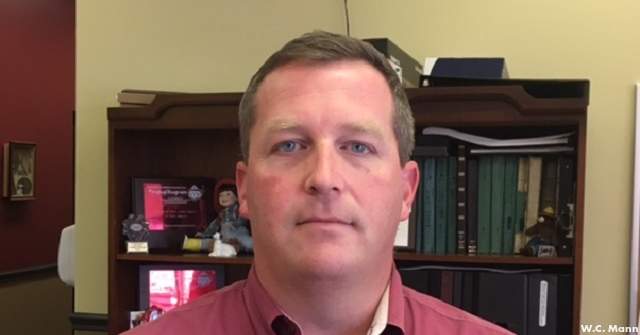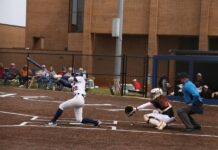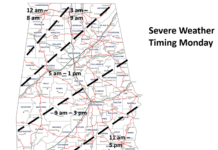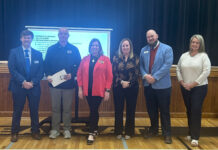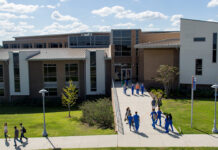Cullman Fire Marshal Chris Chaffin talks fire safety. / Tribune file photo
CULLMAN – With the joy of the holiday season comes colder weather, and with that, come out the heaters, electric blankets and warm fireplaces. Each winter there are tragedies that affect communities around the nation due to the methods taken to stay warm during the cold months. Homes often see more clutter, more activity around fireplaces, more cooking, more electrical usage (often with "creative" use of wiring), more people and more distractions.
Cullman Fire Marshal Chris Chaffin, along with fire chiefs from around the county, has some words of advice for all Cullmanites on how to avoid dangerous situations.
The three most common issues they mentioned encountering in a typical Christmas season are:
- Kitchen fires, especially when cooks are trying to prepare too many things at once, or are distracted by kids or house guests
- Electrical fires from overloaded circuits or shorted wiring in lights
- Ignition of flammable objects and decorations placed too close to heat sources (fireplaces, candles, space heaters, heat lamps for pets or plants)
Chaffin said, “Unattended cooking, failure to follow manufacturer instructions, dry Christmas trees, electrical issues and unattended candles,” are the top sources of fires this time of year.
Regarding Christmas trees, Chaffin shared, “Some people like live Christmas trees. Though very pretty, they can become the largest fire hazard in the home during the holidays. Trees should be watered daily. If you buy a live tree, the lot you purchased from or yourself, should cut approximately 2 inches off the bottom to ensure the tree can absorb the water up through the trunk. Water daily and check often if you have small animals that can get to the water. Ensure that the lights that are on the tree have a UL listing and are rated for indoor use. Do not place trees near fireplaces (wood or gas) or in any path that leads to an exit door. Turn all lights off when not in use, especially at night before bed. Do not leave lights on when not and home and the best bet is to unplug from the wall receptacle.”
Chaffin also spoke about how an overlooked cause of many fires is the electrical wiring in homes.
“Overloads and faulty wiring is a hazard due to the amount of additional Christmas lights being used. Before using, inspect each string of wires for cuts, nicks, dry rot and plug ends are secure. If any of these are found, cut off the ends and throw away. If purchasing new lights, ensure they have a UL rating and they are listed for use for indoor, outdoor, or both. Use caution with the number of extension cords while using light strings. Extension cords should never be plugged into another extension cord. We suggest using power strips that can be used both indoor and outdoor for connections. As with indoor lighting, it is best to be unplugged from the receptacle when not in use. If used with a timer, make sure the timer works, has no signs of overheating and is in good condition. Remember, you get what you pay for, if it is cheap then it probably is not going to be the best choice.”
Chaffin listed off several quick tips that people can heed to help avoid tragedy.
“Everyone should check and ensure all the smoke alarms are working. Fire extinguishers should be checked and be readily available. If you don’t have one, give yourself an early Christmas present and purchase one from a local retailer or fire extinguisher company. A last minute shopping idea is to give weather alert radios,” and finally, “extra caution should be used when using electric space heaters.”
Here's a detailed list of things you can do to keep your home safe this holiday season, according to Chaffin and others:
Christmas trees
- Have the bottoms of live trees freshly cut, so they will more easily absorb water.
- Water live trees DAILY. (According to Chaffin, they are "thirsty, thirsty vegetation.")
- Turn off tree lights at bedtime, even on artificial trees.
- Don't use live candles on the tree.
- Keep trees away from fireplaces and space heaters.
Decorative lights and candles
- Keep candles out of the reach of children.
- As mentioned above, don't put candles on the tree.
- Use plastic clips to hang lights; nails can accidentally penetrate wiring and cause shorts.
- Check labels to see if lights are for indoor or outdoor use, and use accordingly.
Lit fireplaces
- Have the chimney flue cleaned before the first usage of the season.
- Use a grate or screen in front of the fireplace.
- Keep stockings and other decorations out from in front of a lit fireplace.
- Don't set up the tree too close, and don't let gifts pile up toward the fireplace.
Kitchen
- Keep kids out of a busy kitchen.
- Limit the number of cooks and "official tasters" in the kitchen.
- Keep lids handy; cover a grease fire and turn off the stove.
- Don't try to carry a pan full of flaming grease through the kitchen and out the door.
- Don't try to cook everything at once.
- No matter how cold it is, don't bring outdoor grills indoors.
Emergency/escape plan
- Have a fire escape plan, and go over it with visitors.
- When rearranging furniture or setting up decorations, don't block doors.
General seasonal advice
- Get gas lines checked before you turn the heat on for the first time in the season.
- Have a fire extinguisher or two, and make sure they are charged.
- Use smoke alarms and carbon monoxide detectors, and keep good batteries in them.
- Buy space heaters with tip-over switches that can turn them off automatically.
- Keep space heaters away from flammable materials.
- Turn off space heaters when you leave a room or go to bed.
- Avoid the use of any outdoor heating or cooking device for indoor heat.
- If using heat lamps to protect pets or plants, make sure those devices are not mounted on, close to, or pointing directly at combustible materials.
Copyright 2017 Humble Roots, LLC. All Rights Reserved.

